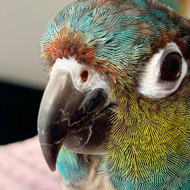Parrot Hormones: Myths & Realities
Posted by Parrot Hormones, Parrot Behaviour on 24/6/2024
Once again hormone season is upon us and for many Parrot parents, it’s a time of woe and ducking for cover when changing food dishes.
Many owners approach hormone season with a resigned sigh, and try to get through it as quickly as possible. Others have no idea the behaviours they are seeing are even caused by hormones. While some even disengage from their Parrots entirely and many first-time owners are often blindsided by the excesses of hormonal behaviour.
Some of you reading this article may even be wondering: ‘What is hormonal behaviour?’
So before we get into the meat of things, it may be helpful to define what hormonal behaviour looks like, as on its own saying a Parrot is “hormonal” is just a label that doesn’t really help us much!
Hormonal behaviour is, at its core, mating behaviour. Your Parrot becomes hormonal because it wants to reproduce and mate. This is a totally natural behaviour and manifests in many ways.
Some of these aren’t very pleasant for us humans and can be potentially harmful to our birds’ quality of life.
Typical hormonal behaviour often looks like: excessive regurgitation, excessive screaming, territorial behaviour over spaces, biting, aggression, egg laying, nest building, looking for nesting sites, obsessions with reflective surfaces and a myriad of other things.
It is often from this that the myth of pairs of birds not being able to bond with humans comes. When Parrots become excessively hormonal, they can become defensive, territorial or even ignore the human part of their flock entirely. However, this doesn’t have to be the case. Sophie and I keep 4 pairs of Parrots, many of them rescues and have no bonding or interaction issues. This is mostly because we manage hormones and engage in bonding activities often.
Hormones are natural to Parrots; they are part of their biology. So wanting to eliminate them is unrealistic and indeed potentially harmful to our birds. We want our Parrots to exhibit natural behaviours, but we also need to balance this with the environment they live in, so that they have a high quality of life and can be interacted with safely.
There are also potential risks to certain species of Parrot if hormones are regularly encouraged or left to play out through egg laying. These include issues such as egg binding, health complications and potential injury to other birds. We want to avoid these risks, so instead of trying to eliminate hormones, or letting them run rampant, we manage them instead.
Something that you might find helpful when managing hormonal behaviour in your Parrot is visualising their hormones as a meter that slowly ticks up. As more and more triggers are added to the environment, we end up with a Parrot who is exhibiting undesirable behaviours we really don’t like to see or who lays eggs excessively.
The less that meter goes up the less hormonal our Parrot is and the less risk there is to our fingers or their health.
Imagine this meter starting in the green and as we add more hormonal triggers it ticks up into the yellow zone, and then the red zone where internal alarms begin blaring and fingers begin throbbing from painful bites.
You may ask what these triggers are?
Some we can’t control at all, such as the time of year, our Parrot’s age or even the weather. However, many we can. Improper diet, food texture, lack of sleep, nesting sites, cosy huts, cage covering, inappropriate petting/touching and lack of stimulation are all very common triggers we can intervene with and help stop from adding to our Parrot’s hormone meter.
Interventions can include, training more regularly so we can safely interact with our Parrots without needing to grab or break out trust with them. It could also be preventing our Parrots from gravitating towards nesting sites or reflective surfaces, and instead providing them more foraging activities to occupy their time.
Things we can do also include tweaking our Parrots’ diet so the consistency of their food is less mushy or includes more fresh items. Diet is often a major cause of excessive hormones in Parrots that gets overlooked. Diets high in excessive fat, large portions, filler ingredients or even sugar can all contribute to that hormone meter. You can also help tick it down by using avian teas, fresh herbs or even some spices.
Looking at your cage setup and how much sleep your Parrot gets could also help out with managing hormone season. Sadly however, there is one factor we can’t control and sometimes we have to wait out: time. Letting hormone season pass or supporting your bird through their ‘terrible twos’ can sometimes be the best option.
It’s also really important not to blame every undesirable behaviour we see in our Parrots on hormones. It’s a very easy trap to fall into as labelling a bird as ‘hormonal’ is a very convenient and easy way to explain lots of problem behaviours.
So if you’re going to use that label, make sure that you have lots of evidence to back it up. Observe your bird closely to ensure there isn’t something else going on in the environment to explain that screaming session your bird had in the afternoon, or the painful nip you got when asking them to step up.
If you’d like more resources on hormonal behaviour I have many free videos on my YouTube channel that could help with exploring the topic further.

